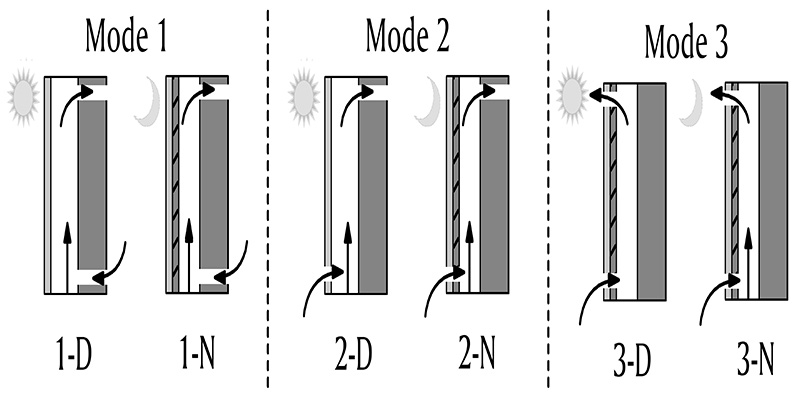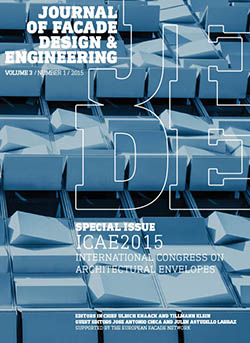

Downloads
DOI:
https://doi.org/10.7480/jfde.2015.1.920Published
Issue
Section
License
Copyright (c) 2015 Dionysios I. Kolaitis, Roberto Garay Martinez, Maria A. Founti

This work is licensed under a Creative Commons Attribution 4.0 International License.
Authors or their institutions retain copyright to their publications without restrictions.
How to Cite
Keywords:
Solar wall (SW), Trombe wall, Phase Change Materials (PCM), experimental data, CFD, simulation, building energy performance, energy savingsAbstract
Solar walls can be used to increase the overall energy efficiency of a building. Phase Change Materials (PCM) are capable of increasing the effective thermal mass of building elements, thus decreasing the overall energy consumption. Recently, the incorporation of PCM in a solar wall has been proposed, aiming to increase the total energy efficiency of the system. The main scope of this work is to investigate the thermal behaviour of a PCM-enhanced solar wall (PCMESW), using experimental and numerical simulation techniques. A prototype PCMESW is installed in a large-scale test facility and is exposed to dynamically changing climate conditions. A broad range of sensors, used to monitor the time-evolution of several important physical parameters, is employed to assess the dynamic response of the PCMESW. In addition, a Computational Fluid Dynamics tool is used to numerically investigate the thermal behaviour of the PCMESW prototype. Predictions of the developing flow- and thermal-field in the PCMESW’s air cavity are validated by means of comparison with the obtained measurements; in general, good levels of agreement are observed. Results of the numerical simulations may support the design optimization process of innovative PCMESW systems.
References
Amundarain Suarez, A., Campos Dominguez, J. M., Chica Paez, J. A., Meno Iglesias, S., Uriarte Arrien, A., Garay Martinez, R., et al. (2014). Passive solar collector module for building envelope. European Patent EP 2520870 B1, 5 March 2014.
Balaras, C. A., Gaglia, A. G., Georgopoulou, E., Mirasgedis, S., Sarafidis, Y., & Lalas, D. P. (2007). European residential buildings and empirical assessment of the Hellenic building stock, energy consumption, emissions and potential energy savings. Building and Environment, 42, 1298-1314.
Khalifa, A. J. N., & Abbas, E.F. (2009). A comparative performance study of some thermal storage materials used for solar space heating. Energy and Buildings, 41, 407-415.
Kolaitis, D. I., & Founti, M. A. (2013). Development of a solid reaction kinetics gypsum dehydration model appropriate for CFD simulation of gypsum plasterboard wall assemblies exposed to fire. Fire Safety Journal, 58, 151-159.
Kolaitis, D. I., & Founti, M. A. (2014). Solar Wall Enhanced with Phase Change Materials: A Detailed Numerical Simulation Study. Proceedings of the 9th Energy Forum on Advanced Building Skins, 28-29 October 2014, Bressanone, Italy, 183-195.
Kottek, M., Grieser, J., Beck, C., Rudolf, B., & Rubel, F. (2006). World Map of the Köppen-Geiger climate classification updated. Meteorological Zeitschrift, 15(3), 259-263.
Manz, H., Egolf, P. W., Suter, P., & Goetzberger, A. (1997). TIM-PCM external wall system for solar space heating and daylighting. Solar Energy, 61, 369-379.
Pomianowski, M., Heiselberg, P., & Zhang, Y. (2013). Review of thermal energy storage technologies based on PCM application in buildings. Energy and Buildings, 67, 56-69.
Soares, N., Costa, J. J., Gaspar, A. R., & Santos, P. (2013). Review of passive PCM latent heat thermal energy storage systems towards buildings’ energy efficiency. Energy and Buildings, 59, 82-103.
Weinlaeder, H., Beck, A., & Fricke, J. (2005). PCM-façade-panel for daylighting and room heating. Solar Energy, 78, 177-186.
Zalewski, L., Joulin, A., Lassue, S., Dutil, Y., & Rousse, D. (2012). Experimental study of small-scale solar wall integrating phase change material. Solar Energy, 86, 208-219.


